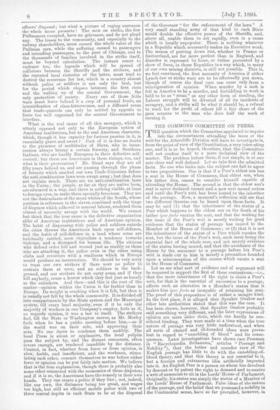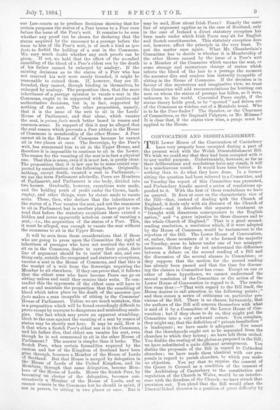THE COMMONS COMMITTEE ON PEERS. T HE question which the Committee
appointed to inquire into the circumstances attending the issue of the writ for the Attercliffe Division will have to investigate is, from the point of view of the Coustitution, a very interesting one, and it is to be hoped, therefore, that the Committee will not confine itself to a mere technical view of the matter. The problem before them, if not simple, is at any rate clear and well defined. Let us take first the admitted facts. No one who looks into the subject can fail to agree to two propositions. One is that if a Peer's eldest son has a seat in the House of Commons, that eldest son, when his father dies, ceases to consider himself capable of attending the House. The second is that the eldest son's seat is never declared vacant and a new writ issued unless and until the Peer's writ has been issued to the inheritor of the peerage. Now, a moment's reflection will see that two different theories can be based upon these facts. It may be said (1) that the inheritance of the status of a Peer which happens to the eldest son on the death of his father ipso facto vacates the seat, and that the waiting for the issue of the Peer's writ is merely waiting for good evidence that the status of peerage has inured to the Member of the House of Commons ; or (2) that it is not the inheritance of the status of a Peer which vacates the seat, but the issue of the Peer's writ, such issue being the material fact of the whole case, and not merely evidence of the status having inured, and that the avoidance of the House by the successor to a peerage before his Peer's writ is made out to him is merely a precaution founded upon a misconception of the causes which vacate a seat in the House of Commons.
Let us see what sort of evidence and of argument will be required to support the first of these contentions,—i.e., that the mere inheritance of the right to claim a Peer's writ, for that is the essential of succession to a peerage, affects such an alteration in a Member's status that it makes him ipso facto as incapable of retaining his seat. The proof of this proposition is of rather a meagre kind. In the first place, it is alleged that Speaker Onslow and other late authorities stated that this was the case. It has been shown, however, that Speaker Onslow probably said something very different, and the later expressions of opinion are mere obiter dicta, which can hardly be con- sidered binding. They were made at a time when the true nature of peerage was very little understood, and when all sorts of absurd and ill-founded ideas were preva- lent in regard to " ennobling of blood " and its conse- quences. Later investigations have shown (see Freeman in " Encyclopaedia Britannica," articles " Peerage and Nobility"), that the better and sounder view of the English peerage has little to do with the ennobling-of- blood theory, and that this theory is not essential to it, but a foreign and extraneous idea artificially imported into it. An English Peer is a person on whom has devolved by descent or by patent the right to demand and to receive a writ of summons to sit in the Lords' House of Parliament. Originally, his status was simply the status of a Member of the Lords' House of Parliament. False ideas of the nature of the peerage, and the belief that we possessed a nobility in the Continental sense, have so far prevailed, however, in our Law-courts as to produce decisions showing that for certain purposes the status of a Peer inures to a Peer even before the issue of the Peer's writ. It remains to be seen whether any proof can be shown for declaring that the status acquired by the successor to a peerage before the issue to him of the Peer's writ, is of such a kind as ipso facto to forbid the holding of a seat in the Commons. We very much doubt whether any such proofs can be given. If not, we hold that the effect of the so-called ennobling of the blood of a Peer's eldest son by the death of his father cannot be enlarged by analogy. If the existing decisions as to the status of a Peer who has not received his writ were surely founded, it might be reasonable to extend them. If, however, they are ill- founded, they cannot, though binding in themselves, be enlarged by analogy. The proposition then, that the mere inheritance of a peerage operates to vacate a seat in the Commons, ought to be supported with most positive and authoritative decisions, but is, in fact, supported by nothing of the sort. The other proposition, namely, that it is the issue of the writ to sit in the Lords' House of Parliament, and that alone, which vacates the seat, is prima facie much better based in reason and common-sense. In support of this it may be alleged that the real reason which prevents a Peer sitting in the House of Commons is membership of the other House. A Peer cannot sit in the House of Commons because he cannot sit in two places at once. The Sovereign, by the Peer's writ, has summoned him to sit in the Upper House, and therefore it is impossible to continue to sit in the Lower. The reason for the vacating of the seat is in fact a physical one. That this is sense, even if it is not law, is pretty clear. The proposition that it is law can be to some extent sup- ported by consideration of the following facts. Originally, nothing, except death, vacated a seat in Parliament,— we use the term Parliament advisedly, Peers are Members of Parliament, and Parliament is one body, divided into two houses. Gradually, however, exceptions were made, and the holding posts of profit under the Crown, bank- ruptcy, and other things, were by statute made to vacate seats. Those, then, who declare that the inheritance of the status of a Peer vacates the seat, and not the summons to sit in Parliament but in another place, have got to con- tend that before the statutory exceptions there existed a hidden and never apparently acted-on cause of vacating a seat,—i.e., the acquisition of the status of a Peer. This, it must be alleged, was enough to vacate the seat without the summons to sit in the Upper House.
It will be seen from these considerations that if those who are going to press upon the Committee the right of inheritors of peerages who have not received the writ to sit on in the Commons, desire to carry their point, their line of argument should be to insist that one, and one thing only, outside the recognised and statutory exceptions, vacates a seat in the House of Commons, and that this is the receipt of a writ from the Sovereign requiring the Member to sit elsewhere. If they can prove that, it follows that the eldest sons who have become Peers can go on sitting unless and until they receive their writs. To con- tradict this the opponents of the eldest sons will have to set up and maintain the proposition that the ennobling of blood which takes place on the death of the ancestor ipso facto makes a man incapable of sitting in the Commons' House of Parliament. Unless we are much mistaken, this is a proposition which will be found exceedingly difficult to prove except by recourse to dangerous and misleading analo- gies. One act which may prove an apparent stumbling- block to the case against the vacating of a seat by reason of status may be shortly met here. It may be said, How is it that when a Scotch Peer's eldest son is in the Commons, and his father dies, that eldest son vacates his seat, even though he is not summoned to sit in the other House of Parliament ? The answer is simpler than it looks. The Scotch Peer, when certain formalities required by the Custom and law of the Kingdom of Scotland have been One through, becomes a Member of the House of Lords of Scotland. But that House is merged by delegation in the Rouse of Lords of the United Kingdom, and its Members, through that same delegation, become Mem- bers of the House of Lords. Hence the Scotch Peer, by becoming an elector of the delegation, becomes con- structively a Member of the House of Lords, and so cannot remain in the Commons lest he should in spirit, if not in person, be sitting in two places at once. But it may be said, How about Irish Peers P Exactly the same line of argument applies as in the case of Scotland, only in the case of Ireland a direct statutory exception has been made under which Irish Peers may sit for English and Scotch constituencies. This statutory exception does not, however, affect the principle in the very least. To put the matter once again. What Mr. Chamberlain's Committee has to decide is whether it is Membership of the other House caused by the issue of a Peer's writ to a Member of the Commons which vacates the seat, or some strange and mysterious change of status which infects the blood of the heir to a peerage the moment the ancestor dies and renders him instantly incapable of sitting in the House of Commons. If the decision is in favour of this mysterious and imaginative view, we trust the Committee will add recommendations for hunting out men on whom the status of peerage has fallen, as it were, unknown to the world. Concealed Peers ought, if the status theory holds good, to be " spotted " and driven out of the Commons as witches out of a Matabele kraal. Who is to be the Peer-finder ? The Speaker, or the Chairman of Committees, or Sir Reginald Palgrave, or Mr. Milman ? It is clear that, if the status view wins, a purge must be applied to the House.











































 Previous page
Previous page